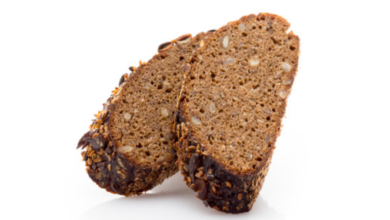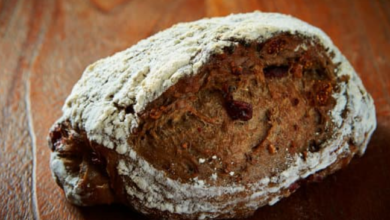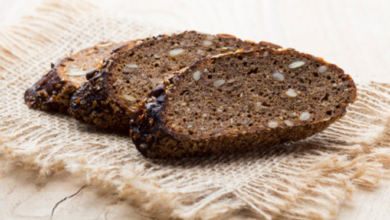Rye Bread Vs Whole Grain Bread: Which One Is Right For You?
What To Know
- In the world of bread, rye bread and whole grain bread stand as two popular choices.
- Rye bread and whole grain bread are both nutrient-rich choices that can contribute to a healthy diet.
- Rye bread has a lower gluten content and a low glycemic index, while whole grain bread is a richer source of vitamins, minerals, and antioxidants.
In the world of bread, rye bread and whole grain bread stand as two popular choices. Both offer nutritional benefits, but understanding their differences is crucial for making informed dietary decisions. This comprehensive guide delves into the nutritional profiles, health implications, and culinary applications of rye bread vs whole grain bread.
Nutritional Profiles
#Rye Bread
- Rich in dietary fiber (both soluble and insoluble)
- Good source of B vitamins (B1, B2, B3)
- Contains minerals such as iron, magnesium, and zinc
- Lower in gluten content compared to wheat bread
#Whole Grain Bread
- Made from whole grains, including the bran, germ, and endosperm
- Excellent source of dietary fiber
- High in vitamins (B vitamins, vitamin E) and minerals (iron, magnesium, zinc)
- Rich in antioxidants and phytonutrients
Health Implications
#Rye Bread
- Improved Digestion: The high fiber content promotes digestive health and regularity.
- Reduced Cholesterol Levels: Soluble fiber can help lower LDL (bad) cholesterol levels.
- May Lower Blood Sugar Levels: Rye bread has a low glycemic index, which means it releases sugar slowly into the bloodstream.
- May Reduce Risk of Heart Disease: The fiber and antioxidants in rye bread may protect against heart disease.
#Whole Grain Bread
- Reduced Risk of Chronic Diseases: Whole grains are associated with a lower risk of heart disease, stroke, type 2 diabetes, and certain cancers.
- Improved Blood Sugar Control: The fiber in whole grain bread helps regulate blood sugar levels.
- Promotes Weight Management: The fiber in whole grain bread can promote satiety and reduce calorie intake.
- May Improve Cognitive Function: Whole grains contain nutrients that may support brain health.
Culinary Applications
#Rye Bread
- Flavor: Rye bread has a distinctive tangy flavor due to the fermentation process.
- Texture: Rye bread is typically denser and chewier than wheat bread.
- Uses: Used in sandwiches, open-faced sandwiches, and as a base for other dishes.
#Whole Grain Bread
- Flavor: Whole grain bread has a nutty and earthy flavor.
- Texture: Can vary from light and fluffy to dense and chewy, depending on the type of whole grains used.
- Uses: Versatile bread used in sandwiches, toast, and as a side dish.
Which Bread is Better?
Both rye bread and whole grain bread offer unique nutritional benefits. The best choice depends on individual dietary needs and preferences.
- For individuals seeking high fiber and a low glycemic index: Rye bread may be a better option.
- For individuals seeking a wide range of vitamins, minerals, and antioxidants: Whole grain bread is a superior choice.
- For individuals with gluten sensitivities: Rye bread has a lower gluten content than wheat bread, making it a suitable alternative.
Conclusion: The Nutritional Champions
Rye bread and whole grain bread are both nutrient-rich choices that can contribute to a healthy diet. By understanding their nutritional profiles, health implications, and culinary applications, individuals can make informed decisions based on their specific dietary requirements and preferences.
FAQ
Q: Is rye bread healthier than whole grain bread?
A: Both rye bread and whole grain bread offer unique nutritional benefits. Rye bread has a lower gluten content and a low glycemic index, while whole grain bread is a richer source of vitamins, minerals, and antioxidants.
Q: How much bread should I eat per day?
A: The recommended daily intake of bread depends on individual calorie needs and activity level. Generally, it is recommended to consume 2-3 servings of whole grains per day, which can include bread.
Q: Is it okay to eat bread if I am trying to lose weight?
A: Yes, you can eat bread if you are trying to lose weight. Choose whole grain bread over white bread, as it is more filling and contains fewer calories. Additionally, portion control is key to maintaining a healthy weight.




